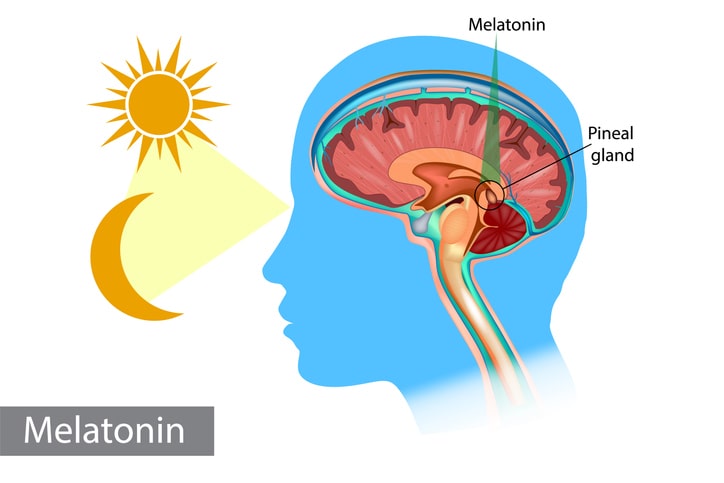This post may contain affiliate links, which means I'll receive a commission if you purchase through my link, at no extra cost to you. Please read the full disclosure here.

Melatonin for Hair Growth--Tired of hearing about the same old hair loss treatments?
Melatonin...I don't know about you but I am such a night owl. And that can be great if my friends and I decide to hit the town on a Saturday night. But not so great during the work week when I'm tossing and turning in bed as my mind works tirelessly to solve all of life's great mysteries. Examples:
What caused The Big Bang?
Have aliens visited earth?
Will that guy from Hinge ever ask me out or will we keep messaging back and forth for another 6 weeks?
What should my next blog post be about?
So melatonin seemed like a great option to help me fall asleep with fewer side effects than some of the other sleeping medications I had looked into.
(I've linked the one I take nightly below. But keep in mind melatonin is thought to help you fall asleep. It may not necessarily help with you staying asleep. Always talk to your doctor before making any changes to your supplement regimen).
But back to hair loss...Then I saw that melatonin wasn't just being used as a sleeping aid where it is taken as a dietary supplement.
Some studies had actually investigated melatonin mediated hair growth when it was applied topically to the scalp in patients with androgenic alopecia. (I've linked one serum I found which includes melatonin as an active ingredient below).
If you're battling with androgenic alopecia then you've probably heard about Minoxidil and Finasteride. To date these are the only agents approved by the Federal Drug Administration (FDA) and European Medicines Agency (EMEA) for treatment of androgenic alopecia: Oral finasteride (for men) and topical minoxidil (for women and men) (1).
But let's face it...These two options don't work great for everyone. Both come with their own set of side effects and different people experience different levels of efficacy with these agents. Thus the search continues to identify alternative treatment options.
Here's what I'm serving up in this post:
Melatonin Overview
How melatonin is thought to work in androgenic alopecia
Discuss some of the studies investigating melatonin for hair growth
Melatonin Overview
Melatonin is a hormone formed and released by the pineal gland in the brain and is also produced by the gut. Some physiological processes regulated by melatonin include (2,3,4) :
Sleep wake cycles
Seasonal biorhythms
Influences the aging process
Melatonin also is known to have strong anti-oxidant properties (5).

Melatonin For Hair Growth: Let's talk mechanism...
How is melatonin thought to work in androgenic alopecia? The exact mechanism is unknown but it is thought to be a possible candidate to counteract the oxidative stress associated with general hair loss as well as androgenic alopecia because of the strong anti-oxidant properties (6).
Human hair follicles have also been shown to synthesize melatonin and express melatonin receptors and an influence on hair growth cycles has been observed (7,8,9).
There's also been pre-clinical work performed in mouse models and even on goat hair follicle stem cells (9,10).
One pre-clinical study has taken a look at human anagen hair follicles cultivated in vitro at a concentration of 30 μM melatonin. Results showed a significantly faster rate of hair follicle growth in comparison to the culture medium alone (11).
Melatonin for Hair Growth: Talk Data To Me...
Now let's discuss some of the clinical studies that have investigated the efficacy of topical melatonin in the treatment of androgenic alopecia.
This study was a double-blind, randomized, placebo-controlled study conducted in 40 women suffering from diffuse alopecia or androgenetic alopecia (12).
You can stalk the study HERE.
The goal of the study was to assess whether topically applied melatonin influences anagen and telogen hair rate in women with androgenetic or diffuse hair loss.
Here's some background on the hair follicle cycles in case you need a refresher:
Hair follicles cycle through three primary phases: anagen, catagen and telogen phases. The anagen or growth phase lasts 2 to 6 years, during which primary hair growth occurs. At any given time, somewhere between 85% and 90% of hair follicles are in this growth phase. There's also the catagen, or transitional, stage of a hair follicle. Then the telogen phase is a resting phase that lasts around three months. After these three phases, the inactive or dead hair is shed (13).
Hair follicles that deviate from this cycle and behave kind of wonky result in conditions like alopecia or telogen effluvium. Bummer...
So this study wants to see how melatonin influences the growth phase vs the resting phase of the hair follicle.
The study duration was 6 months. The treatment group applied a 0·1% melatonin solution to the scalp daily while the control group applied a placebo solution.
Trichograms were performed to assess anagen and telogen hair rate. Blood samples were also taken to assess effects of treatment on physiological melatonin levels
What the results found:
Melatonin significantly increased anagen hair rate in occipital hair in women with androgenetic hair loss compared with placebo. (Occipital is located at the middle point in the back of the head. So if you were to draw a line horizontally across the back of your head connecting your ears... occipital would be that middle point.)
For frontal hair, melatonin gave a significant increase in the group with diffuse alopecia.
The occipital hair samples of patients with diffuse alopecia and the frontal hair counts of those with androgenetic alopecia also showed an increase of anagen hair, but differences were not significant.
When looking at the plasma melatonin levels they did increase in the melatonin treatment group but did not exceed the physiological night peak.
Conclusion: The authors concluded that opically applied melatonin might influence hair growth in humans in vivo. The mode of action is not known, but the effect might result from an induction of anagen phase.
Talk Data To Me...Melatonin for Hair Growth...More Studies
The following study was published in 2012 in the International Journal Of Trichology. I've pulled out a few of the results to highlight below (14).
You can stalk the study HERE.
Five clinical studies showed positive effects of a topical melatonin solution in the treatment of AGA in men and women while showing good tolerability.
The first study took a look at the pharmacodynamics and tolerability of a topical application of a 0.0033% melatonin solution compared with placebo.
The second study was an observational study involving 30 men and women which showed a significant reduction in the degree of severity of alopecia after 30 and 90 days. However, I think it's important to note that this result is being based on questionnaires completed by the investigators and patients.
The third study was an open-label observational study. And this study used a digital software-supported epiluminescence technique (TrichoScan) in 35 men with AGA. This study showed 6 months of topical melatonin treatment resulted in a significant increase in hair density in 54.8% and 58.1% of the men after 3 and 6 months respectively.
The fourth study, was an observational study involving four hair salons and 60 male and female patients with early-stage hair loss. Hair stylists performed a before-and-after comparison and in this study the hair texture was found to have significantly improved and hair loss was found to have significantly decreased. A significant reduction in hair loss was observed in women, while hair loss in men remained constant.
The fifth study was a 3-month, large-scale, open-label, multi-center study involving 1891 female and male patients with Stage I and II AGA, the proportion of patients with 2- and 3-fold positive hair pull tests dropped from 61.6% at baseline to 7.8% after 3 months, while the proportion with negative hair pull tests (no hair loss) rose from 12.2% to 61.5%.
Melatonin for Hair Growth...Some thoughts...
Okay...So... Do I think melatonin might hold some potential? Sure.
But I haven't added melatonin into my hair loss treatment regimen just yet. I think what we have here is a good start but we need more studies investigating topical melatonin.
The first study we took a look at showed positive effects of melatonin on hair growth in patients with androgenic alopecia. But this was a small study based on 40 patients.
The other 5 studies with different study designs showed mostly positive effects resulting from the topical application of a cosmetic melatonin solution with early-stage androgenic alopecia or general hair loss with a partial reduction in hair loss, as well as new hair growth in some cases.
I would want to see more studies evaluating hair density with the Trichoscan method. When evaluating results I think the hair pull test is subject to major variability. Many of the studies were not placebo -controlled and open-label.
I also don't put a ton of value on patient questionnaires or investigator questionnaires. I also don't put a ton of value on hair stylist evaluation. I think the trichogram is probably my gold standard.
As I've mentioned before what works for one person may not work for another and it may take time to figure out what you respond to which can feel really frustrating.
For more information on hair loss treatments check out my other blog posts linked HERE.
For information on exactly what I use check out my e-Book HERE.
In researching products with melatonin as the active ingredient I did find the one linked above and below. If these results intrigued you talk to your doctor about possibly adding this to your own regimen. The below product is also listed as the first and only Hair Growth Serum Approved by the American Hair Loss Association.
Thanks for reading! Be sure to subscribe to make sure you don't miss a post!
xoxxo
-Riley
References:
1. Fischer TW. Alopecia - Diagnostic and Therapeutic Management. Akt Dermatol. 2008;34:209–25.
2. Arendt J. Melatonin. Clin Endocrinol (Oxf) 1988;29:205–29.
3. Lerchl A, Schlatt S. Influence of photoperiod on pineal melatonin synthesis, fur color, body weight, and reproductive function in the female Djungarian hamster, Phodopus sungorus. Neuroendocrinology. 1993;57:359–64.
4. Karasek M, Reiter RJ. Melatonin and aging. Neuroendocrinol Lett. 2002;23(Suppl 1):14–6.
5. Fischer, Tobias W et al. “Topical melatonin for treatment of androgenetic alopecia.” International journal of trichology vol. 4,4 (2012): 236-45. doi:10.4103/0974-7753.111199
6. Tan DX, Chen LD, Poeggeler B, Manchester LC, Reiter RJ. Melatonin: A potent, endogenous hydroxyl radical scavenger. Endocr J. 1993;1:57–60.
7. Fischer TW, Slominski A, Tobin DJ, Paus R. Melatonin and the hair follicle. J Pineal Res. 2008;44:1–15.
8. Fischer TW. The influence of melatonin on hair physiology. Hautarzt. 2009;60:962–72.
9. Kobayashi H, Kromminga A, Dunlop TW, Tychsen B, Conrad F, Suzuki N, et al. A role of melatonin in neuroectodermal-mesodermal interactions: The hair follicle synthesizes melatonin and expresses functional melatonin receptors. FASEB J. 2005;19:1710–2.
10. Zhang W, Wang N, Zhang T, Wang M, Ge W, Wang X. Roles of Melatonin in Goat Hair Follicle Stem Cell Proliferation and Pluripotency Through Regulating the Wnt Signaling Pathway. Front Cell Dev Biol. 2021 Jun 4;9:686805. doi: 10.3389/fcell.2021.686805. PMID: 34150780; PMCID: PMC8212062.
11. Fischer TW, Fischer A, Knöll B, Hipler UC, Elsner P. Melatonin in low doses enhances in vitro human hair follicle proliferation and inhibits hair growth in high doses. Arch Derm Res. 2000;292:147.
12. Fischer TW, Burmeister G, Schmidt HW, Elsner P. Melatonin increases anagen hair rate in women with androgenetic alopecia or diffuse alopecia: Results of a pilot randomized controlled trial. Br J Dermatol. 2004;150:341–5.
13. Murphrey MB, Agarwal S, Zito PM. Anatomy, Hair. [Updated 2021 Aug 11]. In: StatPearls [Internet]. Treasure Island (FL): StatPearls Publishing; 2022 Jan-. Available from: https://www.ncbi.nlm.nih.gov/books/NBK513312/
14. Fischer, T. W., Trüeb, R. M., Hänggi, G., Innocenti, M., & Elsner, P. (2012). Topical melatonin for treatment of androgenetic alopecia. International journal of trichology, 4(4), 236–245. https://doi.org/10.4103/0974-7753.111199


